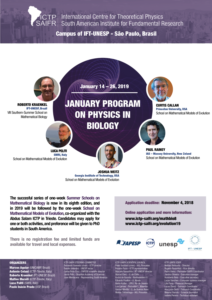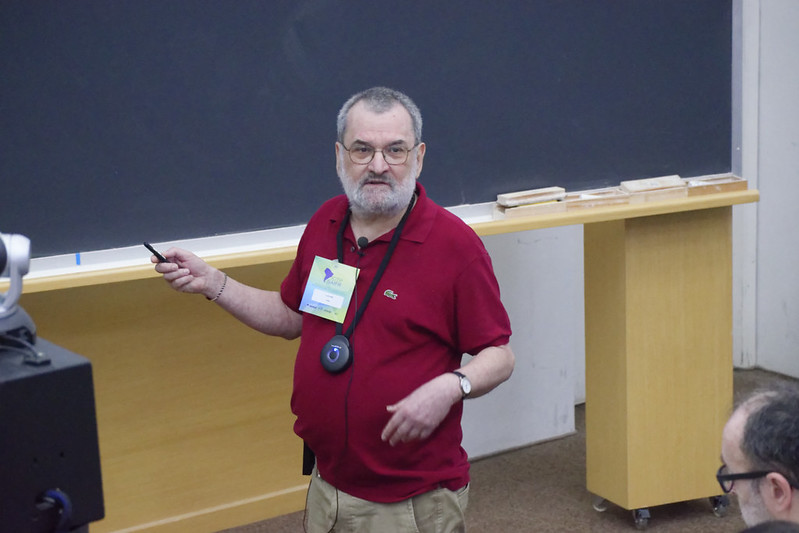Joint ICTP-SAIFR/ICTP-Trieste School on Mathematical Models of Evolution
January 21 – 26, 2019
São Paulo, Brazil
ICTP-SAIFR/IFT-UNESP

Home
Description:
Although new experimental technology is partly responsible for the current revolution in biological research, theoretical models developed by physicists are also playing an important role in changing the way biological research is being performed. The number of theoretical physicists and applied mathematicians migrating into biology has dramatically increased throughout the world, but South America still lags behind.
The one-week school on mathematical models on evolution, co-organized with the Abdus Salam ICTP in Trieste, will feature lectures by physicists and applied biologists who have made important contributions to this area of biological research. The school is intended for graduate students and postdoctoral researchers in the physical and biological sciences.
Organizers:
- Marcus Aguiar (UNICAMP, Brazil)
- Antonio Celani (ICTP-Trieste, Italy)
- Roberto Kraenkel (IFT-UNESP, Brazil)
- Matteo Marsili (ICTP-Trieste, Italy)
- Luca Peliti (SMRI, Italy)
- Paulo Inácio Prado (USP, Brazil)
Satisfaction survey:
- click here
Announcement
Online application is now closed.
Lecturers & Speakers
Lectures:
1. Population genetics and evolution – Luca Peliti (SMRI, Italy)
Understanding how genetic information is transmitted across generations is at the basis of evolutionary theory. This course will review the mechanisms of reproduction, selection, mutation and drift and will be the backbone for the more specific courses below.
2. Evolution of individuality – Paul Rainey (IAS – Massey University, New Zeland)
The origins of multicellularity and cell differentiation are profound problems in biology. Overview of theory and recent experiments.
3. The evolution of immune systems – Curtis Callan (Princeton University, USA)
The immune system has the ability to respond to arbitrary pathogens. Using samples from mice it has been possible to track the evolution of the immune system from embryo to adult, revealing surprising differences between species.
4. Ecology and evolution of viruses – Joshua Weitz (Georgia Institute of Technology, USA)
Viruses shape the fate of cells, populations, and ecosystems. These lectures will provide an overview of the nonlinear dynamics of viruses and their microbial hosts, including theory, models, and evidence for the joint influence of population and evolutionary dynamics.
Seminars:
- Geometry and Disorder of Soft Matter: Smectics, Martensites and Jamming – Danilo Liarte (Cornell University, USA)
- Self-organized patterns: linking behavior with ecological and evolutionary processes – Ricardo Martinez-Garcia (Princeton University, USA)
- Human cooperation as a selfishness/prosociality balance near criticality – John Realpe-Gomez (Xanadu Quantum Technologies Inc, Canada)
- Gene Regulation and Dynamical Efficacy in Antibiotic Responses – Daniel Schultz (Geisel Medical School at Dartmouth, USA)
Videos & Files
School on Mathematical Models of Evolution
Population genetics and evolution – Luca Peliti (SMRI, Italy)
Lecture 1 (Slide 1) – Lecture 2 (Slide 2) – Lecture 3 (Slide 3) – Lecture 4 (Slide 4)
Ecology and evolution of viruses – Joshua Weitz (Georgia Institute of Technology, USA)
Lecture 1 -(Slide 1) Lecture 2 (Slide 2) – Lecture 3 (Slide 3) – Lecture 4 (Slide 4)
Evolution of individuality – Paul Rainey (IAS – Massey University, New Zeland)
Lecture 1 (Slide 1) – Lecture 2 (Slide 2) – Lecture 3 (Slide 3) – Lecture 4 (Slide 4)
The evolution of immune systems – Curtis Callan (Princeton University, USA)
Lecture 1 (Slide 1) – Lecture 2 (Slide 2) – Lecture 3 (Slide 3) – Lecture 4 (Slide 4)
Self-organized patterns: linking behavior with ecological and evolutionary processes – (Ricardo Martinez-Garcia)
Geometry and Disorder of Soft Matter: Smectics, Martensites and Jamming – Danilo Liarte (Cornell University, USA)
Gene Regulation and Dynamical Efficacy in Antibiotic Responses – Daniel Schultz (Geisel Medical School at Dartmouth, USA)
Human cooperation as a selfishness/prosociality balance near criticality – John Realpe-Gomez (Xanadu Quantum Technologies Inc, Canada)
Program
School Program: PDF updated on January 21, 2019
Photos
Additional Information
Registration: ALL participants should register. The registration will be on January 21 at the institute at 10:30 am.
List of Participants: Updated on January 21, 2019
Visa information: Nationals from several countries in Latin America and Europe are exempt from tourist visa. Nationals from Australia, Canada, Japan and USA can apply for an e-visa through VSF Global. Please check here which nationals need a tourist visa to enter Brazil.
Accommodation: Participants, whose accommodation will be provided by the institute, will stay at The Universe Flat. Hotel recommendations are available here
How to reach the Institute: The school will be held at ICTP South American Institute, located at IFT-UNESP, which is across the street from a major bus and subway terminal (Terminal Barra Funda). The address which is closer to the entrance of the IFT-UNESP building is R. Jornalista Aloysio Biondi, 120 – Barra Funda, São Paulo. The easiest way to reach us is by subway or bus, please find instructions here.
Yellow fever vaccination is recommended for travellers going to Brazil. Note that the vaccine needs to be taken at least ten days before the trip to be effective. Information: https://wwwnc.
Ground transportation instructions:
Ground transportation from Guarulhos Airport to The Universe Flat
Ground transportation from Congonhas Airport to the Universe Flat
Ground transportation from The Universe Flat to the institute

